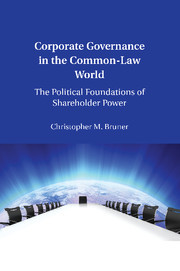Description
Corporate Governance in the Common-Law World
The Political Foundations of Shareholder Power
Author: Bruner Christopher M.
Presents a new comparative theory to explain the divergence between governance systems of Australia, Canada, the United Kingdom and the United States.
Language: English
Subject for Corporate Governance in the Common-Law World:
Approximative price 36.76 €
In Print (Delivery period: 14 days).
Add to cart
Corporate Governance in the Common-Law World
Publication date: 10-2014
Support: Print on demand
Publication date: 10-2014
Support: Print on demand
Approximative price 77.29 €
In Print (Delivery period: 14 days).
Add to cart
Corporate Governance in the Common-Law World
Publication date: 03-2013
318 p. · 15.2x22.9 cm · Hardback
Publication date: 03-2013
318 p. · 15.2x22.9 cm · Hardback
Description
/li>Contents
/li>Biography
/li>
The corporate governance systems of Australia, Canada, the United Kingdom and the United States are often characterized as a single 'Anglo-American' system prioritizing shareholders' interests over those of other corporate stakeholders. Such generalizations, however, obscure substantial differences across the common-law world. Contrary to popular belief, shareholders in the United Kingdom and jurisdictions following its lead are far more powerful and central to the aims of the corporation than are shareholders in the United States. This book presents a new comparative theory to explain this divergence and explores the theory's ramifications for law and public policy. Bruner argues that regulatory structures affecting other stakeholders' interests - notably differing degrees of social welfare protection for employees - have decisively impacted the degree of political opposition to shareholder-centric policies across the common-law world. These dynamics remain powerful forces today, and understanding them will be vital as post-crisis reforms continue to take shape.
Part I. Shareholder Orientation in the Common-Law World: 1. Introduction and overview; 2. Comparative theory and corporate governance; 3. The corporate governance role of shareholders in common-law jurisdictions; Part II. A Political Theory of Corporate Governance in the Common-Law World: 4. Comparative theories of corporate governance; 5. Shareholders, stakeholders, and social welfare policy; Part III. The Theory's Explanatory Domain: 6. Stability, change, and the future of corporate governance in the common-law world.
Christopher M. Bruner is a J. Alton Hosch Professor of Law at the University of Georgia School of Law. His teaching and scholarship focus on corporate law and securities regulation, including international and comparative dimensions of these subjects. Bruner's articles have appeared in a variety of law and policy journals. His comparative study of corporate governance in the United Kingdom and the United States, Power and Purpose in the 'Anglo-American' Corporation, won the 2010 Association of American Law Schools Scholarly Papers competition.
© 2024 LAVOISIER S.A.S.




